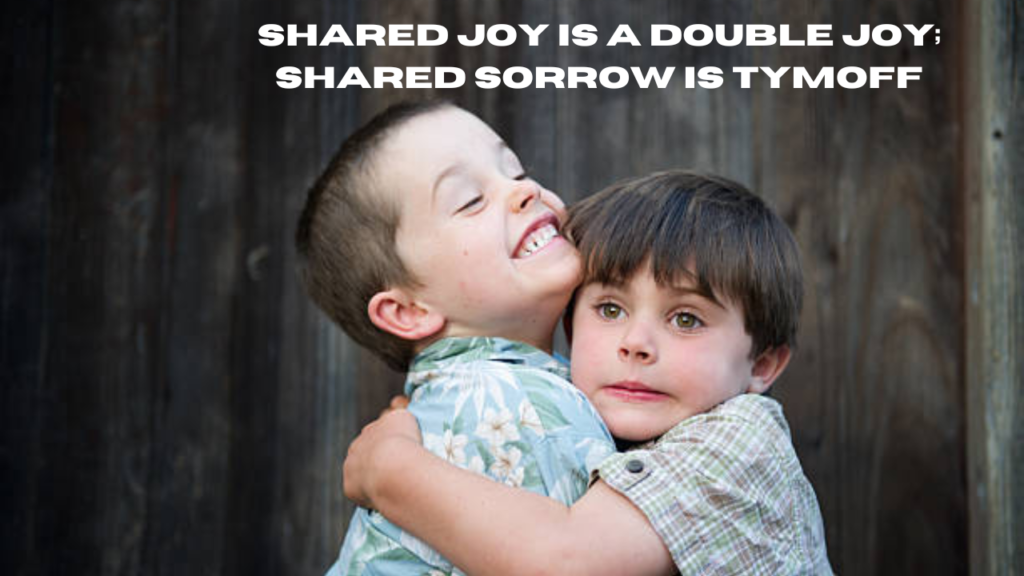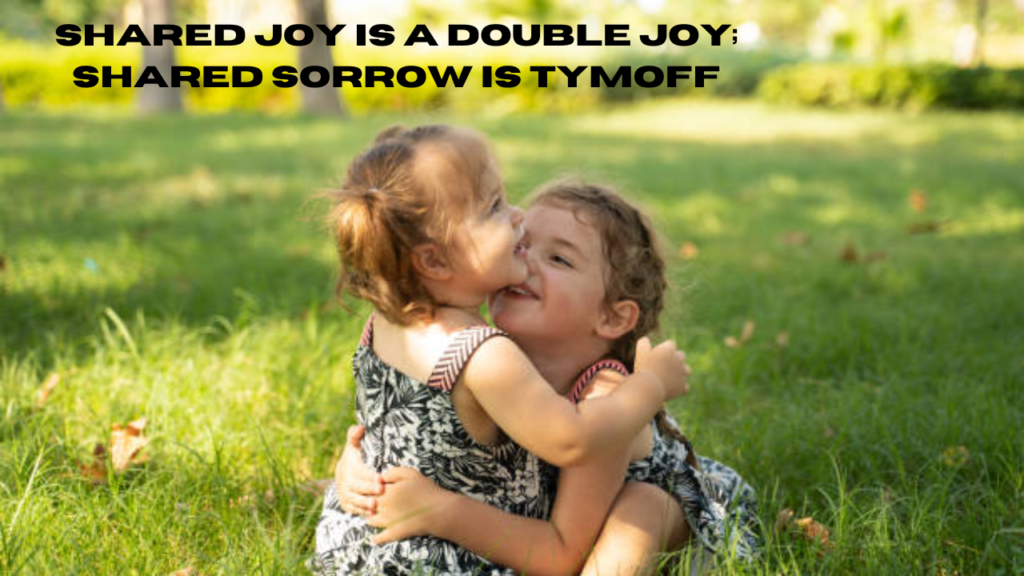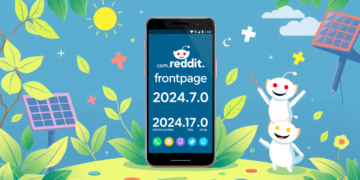Life is a journey filled with moments of happiness and sorrow. As human beings, we are wired to connect, share, and seek solace in one another. The saying, “shared joy is a double joy; shared sorrow is tymoff,” beautifully captures the essence of human emotions and relationships. This proverb conveys that happiness grows when shared, and grief becomes more bearable when expressed. Understanding this principle can significantly impact our personal and social lives, enriching our emotional well-being and strengthening our bonds with others.
The Meaning Behind the Proverb
The phrase ” shared joy is a double joy; shared sorrow is tymoff” carries a profound truth about human interactions. It signifies two key aspects of emotional sharing:
- Joy Multiplies When Shared: Happiness is not meant to be kept to oneself. The feeling intensifies when we share our achievements, celebrations, and joyous moments with friends and family. The warmth and excitement we receive in return amplify the original joy, making the experience even more fulfilling.
- Sorrow Lessens When Expressed: Suffering in isolation can be overwhelming. When we confide in someone about our troubles, we feel a sense of relief. The support and empathy we receive ease our burden, making hardships more manageable. While sharing sorrow does not eliminate the pain, it provides comfort and assurance that we are not alone.
The Science Behind Shared Emotions
Psychologists and researchers have extensively studied the impact of shared emotions on mental well-being. Studies suggest that social connections play a crucial role in regulating emotions. When people share positive experiences, their brain releases more dopamine, the chemical responsible for feelings of pleasure and happiness. On the other hand, discussing one’s struggles triggers the release of oxytocin, which fosters trust and emotional bonding.
Research also indicates that individuals who share their problems with a trusted person experience lower stress levels and improved mental health. Bottling up emotions, on the other hand, can lead to anxiety, depression, and emotional exhaustion. Thus, the proverb is not just a poetic expression but a psychological reality.

How Sharing Joy Strengthens Relationships
Celebrating successes together strengthens friendships and relationships. Imagine winning an award or achieving a significant milestone—sharing the news with loved ones makes the achievement even more memorable. Their excitement and encouragement add to the happiness, making the moment even more special.
In romantic relationships, expressing happiness and celebrating small victories create a deeper emotional connection. Couples who share their joys tend to experience more satisfaction and closeness in their relationships. Similarly, acknowledging achievements and celebrating team successes in workplaces fosters a positive work environment and enhances team morale.
The Power of Sharing Sorrow
Difficult times test our emotional resilience, and having someone to lean on can make all the difference. Sharing sorrows does not mean seeking pity; it is about finding comfort in understanding and empathy. When we open up about our struggles, we receive encouragement, advice, and a fresh perspective, helping us navigate challenging times.
Many support groups are built on the foundation of shared sorrow. Whether it is grief counseling, addiction recovery groups, or mental health support communities, the act of sharing pain helps individuals heal. Knowing that others have faced similar struggles and emerged stronger provides hope and reassurance.
Why Some People Hesitate to Share
Despite the evident benefits, some individuals struggle to share their emotions. There are several reasons for this hesitation:
- Fear of Judgment: Some people worry about being judged or misunderstood when they express their emotions.
- Cultural and Societal Norms: In some cultures, discussing emotions is discouraged, and people are expected to handle challenges independently.
- Trust Issues: Past experiences of betrayal or lack of support may make individuals reluctant to open up.
- Misconception About Strength: Many equate emotional vulnerability with weakness, believing that keeping emotions to themselves is a sign of strength.
Overcoming these barriers requires a shift in mindset. Recognizing that sharing emotions is a sign of emotional intelligence and strength can encourage individuals to embrace vulnerability.
How to Cultivate a Culture of Sharing
Encouraging an environment where people feel comfortable expressing their emotions can lead to stronger relationships and a healthier society. Here are a few ways to foster this culture:
- Practice Active Listening: When someone shares their emotions, listen attentively without interrupting or judging. Validate their feelings and offer support.
- Encourage Open Conversations: Create safe spaces where people feel comfortable discussing their feelings without fear of criticism.
- Be Vulnerable Yourself: Leading by example can inspire others to open up. When you share your own experiences, it reassures others that they are not alone.
- Offer Support Without Expectations: Sometimes, people need a listening ear rather than solutions. Offering comfort without imposing advice can make a significant difference.
- Celebrate Others’Others’ Successes: Genuine happiness for others fosters positive relationships. Acknowledging and rejoicing in others’ achievements strengthens bonds.
The Role of Social Media in Sharing Emotions
In today’s digital age, social media has become a primary platform for sharing emotions. People post about their achievements, milestones, and even struggles. While social media allows instant sharing and support, it also has downsides. The curated nature of online content can sometimes create unrealistic expectations and comparisons.
However, when used mindfully, social media can be a powerful tool for spreading positivity. Encouraging uplifting interactions, supporting others, and engaging in meaningful conversations can promote a healthier online environment.

Also Read: The Correct Spelling Is School Not School. Some Pe – Tymoff: A Deep Dive Into the Viral Phrase
Last Review
The proverb ” shared joy is a double joy; shared sorrow is tymoff” holds a timeless truth about human connection. Sharing happiness multiplies joy, while opening up about sorrows lightens the emotional burden. In a world where people often struggle with loneliness and emotional distress, fostering a culture of sharing can significantly improve individual and collective well-being.
By embracing this wisdom, we can build stronger relationships, create supportive communities, and lead more fulfilling lives. The next time you experience joy, share it with someone. When you face hardship, reach out for support. In doing so, you will realize that true happiness and healing lie in human connection.































Comments 1